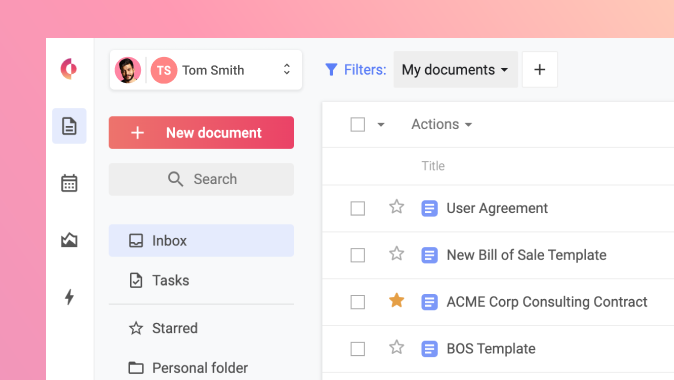Contract Storage: 5 Key Elements for Success in 2024
Table of contents
-
About Concord
Effortless contract management, from drafting to e-signing and beyond. Book a live demo to see Concord in action.
Request demo
Storing contracts shouldn’t just be about having a repository of documents. There are steps that need to be taken for the contract storage to be an asset for your business, and not an additional hassle.
In this article, we’ll provide you with 5 actionable insights on how to store your online contracts efficiently. We’ll also discuss how CLM software can help with managing your contract repository.
5 tips for contract storage
Before we get into each of the tips in more detail, let’s see what the key elements of contract storage are:
- Proper data organization
- Easy searchability
- Collaboration
- Storage security
- Renewal tracking
1. Proper data organization
From the very beginning of a document’s creation, it should be tagged and put into a folder. Furthermore, the folder structure should clearly label its contents. Having a formal document structure across an organization makes it easy for teams to find what they need.
What’s more, storage is easier because teams are able to follow the same processes of organization for contracts. No more storing on desktops and computer folders that only one person has access to! With a robust organization system, locating a contract becomes much simpler.
2. Easy searchability
Beyond just an organization that involves clear document structure, finding a contract should be easy through an extensive search functionality. Being able to easily search and locate documents through the tags and folder names that they were organized in, or even by keywords and phrases in their terms and conditions makes a process that used to take hours turn into just a few seconds.
While many storage products offer some form of search, having OCR (Optical Character Recognition) functionality is key for the best document storage and access. OCR captures an image of a document and makes it searchable. Meaning that even legacy or hard-copy contracts can be a part of the overall dataset.
3. Enabling collaboration
One of the core components of a contract is that at least two people need access to view, edit, and follow up on it. If you store a contract on an individual’s desktop, it’s impossible for other parties to get access to the most updated version.
Even if the document is shared with everyone involved on an online drive, collaboration is difficult. If a question comes up in the middle of a contract, offline storage means going through the tedious email process again.
The ability to have all parties working together on a single version increases the capability to work together better. Having a full audit trail of edits is important for legal purposes. Additionally, it makes it easy to find answers to any questions on who said what.
4. Storage Security
If contracts aren’t stored in the cloud, not only are they more difficult to locate and collaborate on, but they’re likely much less secure. File cabinets and even computers aren’t safe from natural disasters or hacks. The cloud is the most secure level of storage for modern businesses. When handling sensitive information such as that contained in contracts, bank-level security should be a part of whatever platform is used.
Large cloud providers like Amazon and Microsoft provide secured off-site data warehouses with the sole purpose is storing and protecting data. Internally stored data is only as secure as the least reliable employee or IT contractor.
5. Renewal tracking
Simply storing an agreement versus tracking metadata such as renewals puts a company at risk. A full storage solution should contain contract management throughout the lifecycle of a document — which means well after signature.
Regular reports of upcoming contract renewals should come well in advance of deadlines, with notifications so that teams can assess the value and possibilities for increased revenue gain at the time of expiration or renewal. Or discount potential on the buy side. Having a full picture of an organization’s contracts means being aware of everything that’s coming up. Furthermore, it analyzes where to focus spending for increased revenue and saved money.
How CLM software helps store contracts
Contract management software features can help you apply our tips. It can also enhance the efficiency and security of contract storage.
Below are some ways in which CLM software aids in storing contracts:
- Centralized cloud repository: CLM software provides a centralized platform for storing contracts, eliminating the need for disparate storage systems. This leads to better organization and easier retrieval of contracts.
- Enhanced searchability and accessibility: With advanced search functions, users can quickly find contracts using various parameters. This feature streamlines the process of locating specific documents, saving time and effort.
- Collaboration and version control: CLM tools facilitate collaboration by allowing multiple parties to access and work on contracts simultaneously. This ensures that everyone is working on the most current version of a document.
- Security and compliance: These systems offer robust security measures to protect sensitive contract data. This includes encryption and secure cloud storage, safeguarding against data breaches, and ensuring compliance with regulations.
- Automated renewal tracking: CLM software automatically tracks contract renewals, sending notifications and reminders. This feature helps businesses stay on top of contract expirations and renewal deadlines, preventing oversight and potential losses.
- Comprehensive Reporting and Analytics: Modern CLM software provides a dashboard for detailed reporting and analytics. This allows users to tailor reports to monitor specific contract aspects, facilitating informed strategic decisions.
By employing these features, CLM software transforms contract storage from a mere repository into a dynamic tool that enhances business operations, compliance, and strategic planning.
In conclusion, efficient contract storage is more than just a repository; it’s a strategic asset. By focusing on the 5 key elements outlined in this article, businesses can transform their approach to contract management. CLM software can even further enhance this process. These tools not only simplify contract storage but also contribute significantly to overall business efficiency and strategic decision-making.



